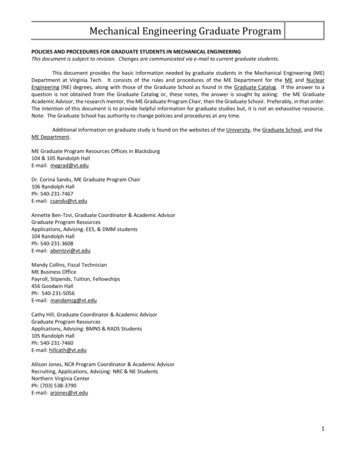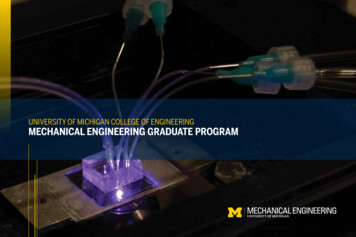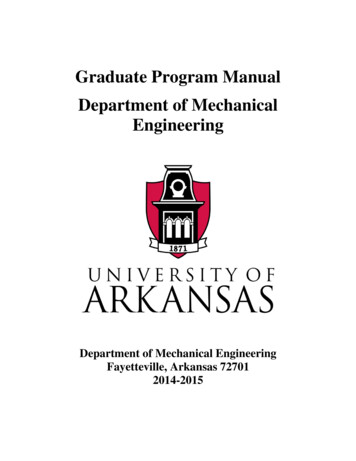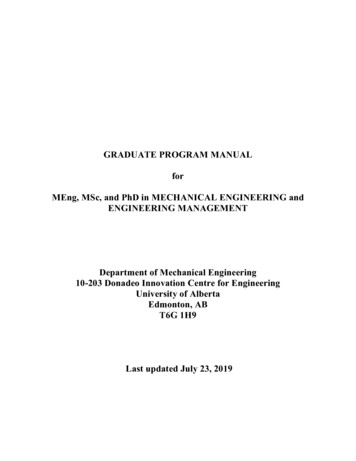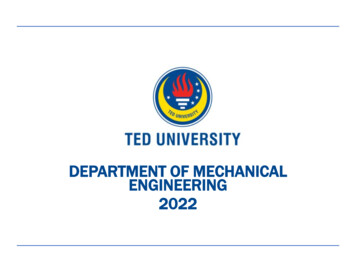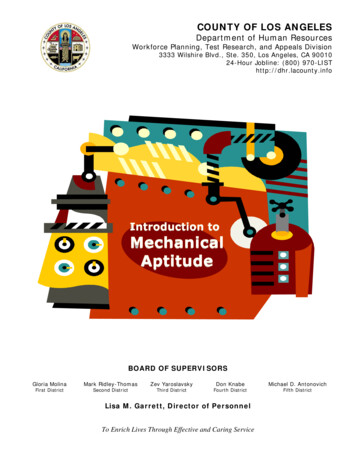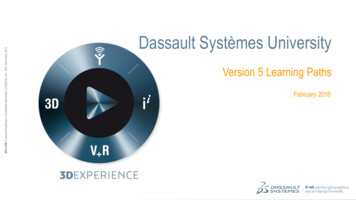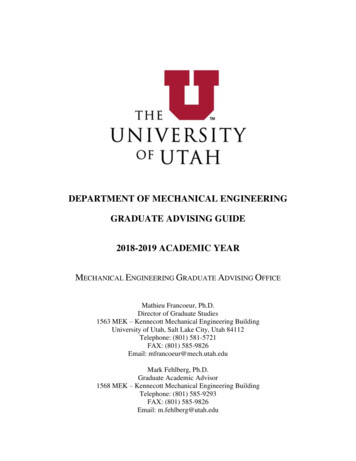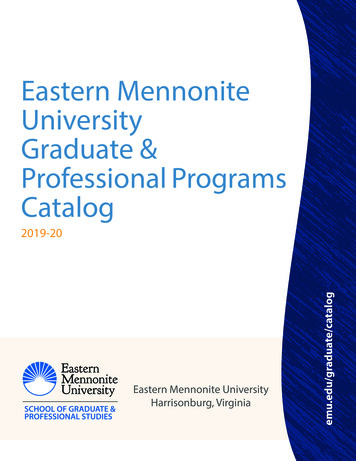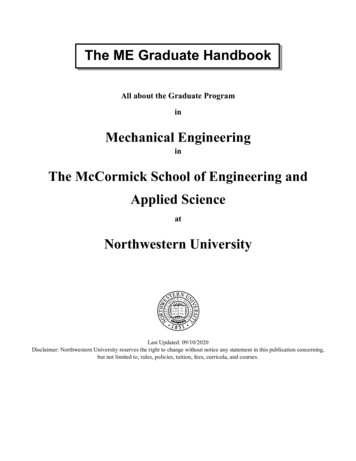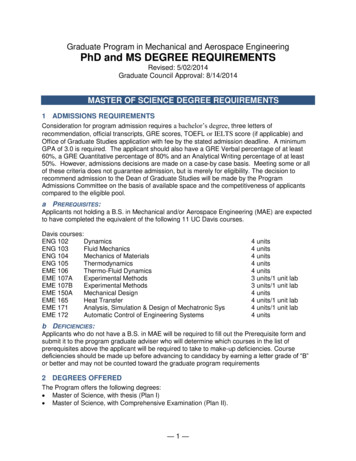
Transcription
Graduate Program in Mechanical and Aerospace EngineeringPhD and MS DEGREE REQUIREMENTSRevised: 5/02/2014Graduate Council Approval: 8/14/2014MASTER OF SCIENCE DEGREE REQUIREMENTS1 ADMISSIONS REQUIREMENTSConsideration for program admission requires a bachelor’s degree, three letters ofrecommendation, official transcripts, GRE scores, TOEFL or IELTS score (if applicable) andOffice of Graduate Studies application with fee by the stated admission deadline. A minimumGPA of 3.0 is required. The applicant should also have a GRE Verbal percentage of at least60%, a GRE Quantitative percentage of 80% and an Analytical Writing percentage of at least50%. However, admissions decisions are made on a case-by case basis. Meeting some or allof these criteria does not guarantee admission, but is merely for eligibility. The decision torecommend admission to the Dean of Graduate Studies will be made by the ProgramAdmissions Committee on the basis of available space and the competitiveness of applicantscompared to the eligible pool.a PREREQUISITES:Applicants not holding a B.S. in Mechanical and/or Aerospace Engineering (MAE) are expectedto have completed the equivalent of the following 11 UC Davis courses.Davis courses:ENG 102DynamicsENG 103Fluid MechanicsENG 104Mechanics of MaterialsENG 105ThermodynamicsEME 106Thermo-Fluid DynamicsEME 107AExperimental MethodsEME 107BExperimental MethodsEME 150AMechanical DesignEME 165Heat TransferEME 171Analysis, Simulation & Design of Mechatronic SysEME 172Automatic Control of Engineering Systems4 units4 units4 units4 units4 units3 units/1 unit lab3 units/1 unit lab4 units4 units/1 unit lab4 units/1 unit lab4 unitsb DEFICIENCIES:Applicants who do not have a B.S. in MAE will be required to fill out the Prerequisite form andsubmit it to the program graduate adviser who will determine which courses in the list ofprerequisites above the applicant will be required to take to make-up deficiencies. Coursedeficiencies should be made up before advancing to candidacy by earning a letter grade of “B”or better and may not be counted toward the graduate program requirements2 DEGREES OFFEREDThe Program offers the following degrees: Master of Science, with thesis (Plan I) Master of Science, with Comprehensive Examination (Plan II).—1—
3 COURSE REQUIREMENTS* No course that was required for, or used towards completion of another degree (BS/MS, etc)at UC Davis or another institution, can be used towards the requirements for this degree.a MASTER OF SCIENCE WITH THESIS (PLAN I):Students must develop their plan of study in consultation with their major professor (Section 5c).A minimum of 38 units and a thesis are required. Of these 38 units, 24 must come fromcoursework with a letter grade, including a minimum of 20 units of graduate courses (200 level)from an engineering graduate program, and a minimum of 12 units from MAE graduate levelcourses. The remaining 4 units of required letter-graded coursework may be satisfied withgraduate or upper division undergraduate coursework in engineering or any other field that isrelevant to the student’s research (e.g. mathematics, biology, etc.). These 4 units may not befrom the list of courses required for the BS degree, but rather from electives. The remainder ofthe 38-unit requirement consists of a minimum of 2 units of MAE 297 Seminar and a minimumof 12 thesis research (MAE 299, 290C series) units and/or additional coursework. Requirementsassociated with the thesis are described in section 8.Students must enroll in a minimum of 12 units per quarter to be considered in full-time status.Two six-week summer sessions may be counted as the equivalent of one regular quarter forpurposes of satisfying the residency requirement if a minimum of two units are taken in eachsummer session. The 12 units can be made up of required coursework, seminar (MAE 297),and research units (MAE 290C and 299).b MASTER OF SCIENCE WITH COMPREHENSIVE EXAMINATION (PLAN II):Students must develop their plan of study in consultation with their major professor (Section 5c).—2—
A minimum of 38 units and successful completion of the Comprehensive Examination arerequired. 36 units of coursework must be taken for a letter grade. These 36 units must includea minimum of 32 units of graduate courses (200 level) from an engineering graduate program,with at least 18 of the 32 units from MAE courses. The remaining 4 units of required lettergraded coursework may be satisfied with graduate or upper division undergraduate courseworkin engineering or any other field that is relevant to the student’s research (e.g. mathematics,biology, etc.). These 4 units may not be from the list of courses required for the BS degree, butrather from electives. In addition to the 36 units of coursework, a minimum of 2 units of MAE297 Seminar are required, for a total of 38 units. Requirements associated with theComprehensive Examination are described in section 8.Students must enroll in a minimum of 12 units per quarter to be considered in full-time status.Two six-week summer sessions may be counted as the equivalent of one regular quarter forpurposes of satisfying the residency requirement if a minimum of two units are taken in eachsummer session. The 12 units can be made up of required coursework, seminar (MAE 297),and research units (MAE 290C and 299).4 SPECIAL REQUIREMENTSThere are no special requirements.5 COMMITTEESa GRADUATE STUDENT ADMISSIONS COMMITTEE:Once the completed application package, including all supporting materials and the applicationfee have been received, the application will be submitted to the Admissions Committee. TheAdmissions Committee consists of the Graduate Advisor for Admissions (Chair of theCommittee) and two Graduate Program members who are appointed by the Program Chair.The role of the admissions Committee is to review each entire application and to make arecommendation to accept or decline an applicant’s request for admission. Thatrecommendation is forwarded to the Dean of Graduate Studies for final approval. Notificationsof admission decisions are sent to the applicants by the Office of Graduate Studies. The priorityadmission deadline is typically December 15 of the previous calendar year for the next Fallentering class. No applications are accepted after the final admission deadline, typicallyFebruary 15 of the year of the Fall quarter for which admission is sought. Prospective applicantsare advised to consult the website of the Office of Graduate Studies (gradstudies.ucdavis.edu)for current application deadlines.b GRADUATE STUDIES COMMITTEE:The Graduate Studies Committee (GSC) comprises the Chair of the MAE GraduateProgram/Department (Chair of the committee), the Graduate Advisor for Continuing Students,the Graduate Advisor for Admissions, two Graduate Program members who are appointed bythe Program Chair, and a student representative.The GSC is responsible for a) making recommendations regarding requirements for graduatedegrees and other programmatic proposals for consideration by Program faculty; b) assistingthe Department/Program Chair and the two Advisers in administering the graduate program; c)making fellowship decisions and d) appointing standing and ad hoc committees as necessary toproperly administer the activities of the Program.—3—
c COURSE GUIDANCE COMMITTEE:Although there is no guidance committee for the MS degree, students are expected to developtheir plan of study through the advisement of the major professor who approves it by signing theMS Advance to Candidacy form. Master’s students must file an Application for Advancement toCandidacy with the Office of Graduate Studies after completion of at least one-half of thedegree requirements and at least one quarter before completion of all requirements. Forstudents with an overall GPA below 3.0 at the time of application for advancement to candidacy,the application may only be submitted if the GPA is close enough to 3.0 that successfulcompletion of coursework at the end of the quarter during which the application is filed will bringthe student above the required GPA minimum of 3.0.d THESIS COMMITTEE (PLAN I) AND COMPREHENSIVE EXAMINATION COMMITTEE (PLAN II):In consultation with their major professor and graduate advisor, students identify three facultymembers to serve on their Thesis Committee (Plan I). The major professor, who is the Chair ofthe committee, is recommended or assigned for the student by the Graduate Advisor forAdmissions upon admission. However, the student may decide to choose a different advisor atany time. The other two committee members may come from any Engineering GraduateProgram, and one member may come from outside Engineering if this individual has a specialinterest and expertise in the thesis topic. It is possible, under some circumstances, to suggest acommittee member from outside UC Davis. Typically, this individual would have specialexpertise and/or qualifications that cannot be duplicated on campus. In this case, an ExternalCommittee Membership form must be submitted for approval. These nominations are submittedto the Office of Graduate Studies for formal appointment in accordance with Graduate Councilpolicy (DDB80, Graduate Council B.1.).The role of the Thesis Committee is to advise the student on the research topic and methods,and then to review the final completed thesis for acceptance. Students are expected to meetwith the Chair of their thesis committee regularly. Thesis committee members are expected toread and comment on a thesis within four weeks from its submission. This time limit policy doesnot apply to summer periods for faculty holding nine-month appointments. The student andfaculty will coordinate a timeline for the student to present the thesis to the thesis committee.This timeline must allow all thesis committee members enough time to fulfill their responsibilitieswithin the four-week deadline.The Comprehensive Examination Committee (Plan II) consists of three MAE Graduate Programmembers, including the student’s faculty mentor and two other Graduate program membersselected by the faculty mentor in close conjunction with the student.The role of the Comprehensive Examination Committee is to administer the ComprehensiveExamination as described in Section 8b.6 ADVISING STRUCTURE AND MENTORINGThe Graduate Adviser for Continuing Students is a resource for all graduate students in theProgram to provide information and advising on academic requirements, policies andprocedures. The Graduate Adviser’s signature is the only signature recognized as official by theOffice of Graduate Studies on a variety of petitions and forms used by graduate students. Inparticular, the Graduate Adviser for Continuing Students is responsible for the following: a)serves on the MAE Graduate Study Committee & TA Selection Committee; b) handles all Officeof Graduate Studies and MAE program forms; c) performs periodic review of student progresstoward degree objectives; d) enforces MAE Graduate Procedures and Requirements; e) hasresponsibility for the content of MAE Graduate Program Web Pages; and f) assists the—4—
Graduate Adviser for Admissions in Block Grant allocation decisions. The Graduate Adviser forContinuing Students is available for consultation by direct appointment.The Graduate Adviser for Admissions a) chairs the MAE Graduate Admissions Committee; b)serves on the MAE Graduate Study Committee & TA Selection Committee; c) is responsible fornew student recruitment; d) is responsible for allocating Graduate Program Fellowship funds, inconsultation with the Graduate Adviser for Continuing Students; and e) approves change ofmajor, change of degree objective and readmission applications.The Major Professor (faculty adviser) is the faculty member who assists the student inpreparing a detailed study program and who supervises the research that forms the basis forthe thesis or dissertation. The major professor’s responsibilities include to: a) assist the studentwith preparation of program of study; b) supervise student thesis or dissertation research; c)assign a grade for MAE-299 (research) and MAE-290C (research conference) units; and d)serve as the chairperson of the thesis or dissertation committee. One of the most criticaldecisions in a graduate student’s career is the selection of a Major Professor (Thesis Adviser).The selection of a Major Professor and a research topic requires careful thought because thethesis/dissertation research is the principal activity of a graduate student and often defines thefuture career directions of the student. Each student is assigned an initial faculty contact uponadmission. The Graduate Program Coordinator must be notified if the student decides on aMajor Professor who is different from the initial faculty contact. The Major Professor must be amember of the MAE Graduate Program.The Mechanical & Aerospace Engineering Graduate Program has adopted the UC DavisGraduate Council Mentoring Guidelines and has posted them on the website(http://mae.ucdavis.edu/programs/grad studies/).7 ADVANCEMENT TO CANDIDACYEvery student must file an official application for Candidacy for the Master’s Degree and pay thecandidacy fee after completing one-half of their course requirements and at least one quarterbefore completing all degree requirements. The Candidacy for the Degree of Master form canbe found online at: http://www.gradstudies.ucdavis.edu/forms/. A completed form includes a listof courses the student will take to complete degree requirements. If changes must be made tothe student’s course plan after advancement to candidacy, the Graduate Adviser mustrecommend these changes to the Office of Graduate Studies. Students must have theirGraduate Adviser and thesis committee Chair sign the candidacy form before it can besubmitted to the Office of Graduate Studies. If the candidacy is approved, the Office ofGraduate Studies will send a copy to the Thesis Committee Chair, the appropriate graduatestaff person, and the student. If the Office of Graduate Studies determines that a student is noteligible for advancement, the graduate program and the student will be told the reasons for theapplication’s deferral. Examples of reasons for deferring an application include: grade pointaverage below 3.0, outstanding “I” grades in required courses, or insufficient units.Students in the MS program are expected to advance to candidacy in their 3rd quarter. Studentshaving to make-up deficiencies are expected to advance to candidacy in their 4th quarter.8 COMPREHENSIVE EXAMINATION AND THESIS REQUIREMENTSa THESIS REQUIREMENTS (PLAN I):Filing of an M.S. thesis with the Office of Graduate Studies is normally the last requirementsatisfied by the candidate. The deadlines for completing this requirement are listed each—5—
quarter in the campus General Catalog (available online at the website of the Office of theRegistrar or from the Bookstore). A candidate must be a registered student or in Filing Feestatus at the time of filing a thesis, with the exception of the summer period between the end ofthe Spring Quarter and the beginning of Fall Quarter.The MAE Graduate Program adheres to the regulations instituted by the Office of GraduateStudies l.b COMPREHENSIVE EXAMINATION (PLAN II):Fulfillment of the Comprehensive Examination is the last requirement of the M.S. Plan II. Astudent may take the comprehensive examination once they have advanced to candidacy.However, it is important that the capstone requirement be completed at or near the end of thecoursework for the Master’s degree; for most students, the exam is taken at the end of the 3rdquarter.The comprehensive examination requirement includes both the submission of a technical reportto the Comprehensive Examination committee (see section 5d) and passing a one-hour oralexam administered by that same committee. The technical report is to be written under thedirection of a faculty mentor, who must be a member of the graduate program.The scope of the oral exam is the candidate’s coursework as well as the project work.The Exam committee’s unanimous vote is required to pass a student on the exam. If a studentdoes not pass the exam, the committee may recommend that the student be reexamined onemore time, but only if the Graduate Adviser concurs with the committee. The second exam musttake place within one quarter of the first exam. The format of the second exam is the same asthat of the first exam and may include the submission of an amended version of the report. Theexamination may not be repeated more than once. A student who does not pass on the secondattempt is subject to disqualification from further graduate work in the program.Once passed, the Master’s Report form is signed by the Program Graduate Adviser and thenforwarded to the Office of Graduate Studies. The deadlines for completing this requirement arelisted each quarter in the campus General Catalog (available online at the website of the Officeof the Registrar or from the Bookstore). A candidate must be a registered student or in FilingFee status at the time the program submits the form, with the exception of the summer periodbetween the end of the Spring Quarter and the beginning of Fall Quarter. The program must filethe report with Graduate Studies within one week of the end of the quarter in which thestudent’s degree will be conferred.9 NORMATIVE TIME TO DEGREENormative Time is the elapsed time, calculated to the nearest quarter, that students would needto complete all requirements for the degree, assuming that they are engaged in full-time studyand making adequate progress. There are two parts to Normative Time: Normative Time toAdvancement to Candidacy and Normative Time in Candidacy. For Plan I, Normative Time inCandidacy represents the number of quarters that are recommended for completion of thethesis.a MASTER OF SCIENCE WITH THESIS (PLAN I):Normative Time to Advancement to Candidacy: 3 quartersNormative Time to Degree: 6 quarters—6—
b MASTER OF SCIENCE WITH COMPREHENSIVE EXAMINATION (PLAN II):Normative Time to Advancement to Candidacy: 3 quartersNormative Time to Degree: 4 quarters10 TIMELINE AND SEQUENCE OF EVENTSFull-time students in the M.S. program are expected to broadly adhere to the following timeline.The numbers indicate the consecutive quarter of enrollment:MSPlan IMSPlan IIwithdeficiencies1, 2, 3, 41, 2, 3,41, 2, 3, 4, 5Select Faculty Research Advisor or ProjectMentor (if different than assigned advisor)22per planSelect a Master’s Thesis committee (Plan I)2n/aper planFile an Application for Candidacy whichincludes a plan of study33per plan 1Pass the Comprehensive Examination (Plan II)n/a3per plan 1File a Master’s Exam Report Form – Plan IIn/a4per plan 1Complete the thesis, gain approval from thecommittee and submit to the Office ofGraduate Studies (Plan I)6n/aper plan 1Take coursework11 SOURCES OF FUNDINGFunding is provided in the following forms: Departmental Fellowships, Graduate StudentResearch Assistantships (GSR), Teaching Assistantships (TA), Reader positions.12 PELP, IN ABSENTIA, AND FILING FEE STATUSa PLANNED EDUCATIONAL LEAVE PROGRAM (PELP):The Planned Educational Leave Program is designed to allow students to suspend theirprograms of study for good cause to leave the campus and guaranteed the right to return laterto resume academic work with a minimum of procedural difficulty. Examples of good cause forPELP include illness, temporary departure from the University for employment or research awayfrom campus, preparing for examinations if doing so at a distance from campus, financialhardship, or personal problems. PELP is recommended for those students who are certain ofthe quarter in which they plan to return and who plan to be away no longer than three quarters.If a student is not certain of the return date, filing an Application for Readmission is suggestedinstead.Students on PELP cannot Advance to Candidacy (for either the M.S. or Ph.D.), take theComprehensive Examination or file a thesis until they have returned from PELP to registeredstatus.—7—
More information about PELP can be found in the Graduate Student ons/b IN ABSENTIA STATUSInformation about In Absentia status (reduced fees when researching out of state) can be foundin the Graduate Student Guide: http://www.gradstudies.ucdavis.edu/publications/c FILING FEE STATUS:Normally, candidates for the MS degree will file a final approved copy of their thesis with theOffice of Graduate Studies during their final quarter of residence on campus. Filing Fee statusis designed for MS students who have completed all other requirements (such as coursework,laboratory work/research, preparation of the thesis, and have Advanced to Candidacy), and whomay not require an additional quarter in residence to prepare the final thesis or dissertationmanuscript. In this case, filing fee would replace regular registration. Students on filing fee areexpected to make no demands upon faculty time other than the time involved in reading thethesis.A student must have been in full-time residence for a minimum of 3 quarters to be eligible. Astudent will be allowed to stay on filing fee for a maximum of 1 quarter. An extension of anadditional quarter is possible under unusual circumstances. In order to be a registered studentagain after being on filing fee status, it will be necessary to file a Readmission application.Please note that a student is expected to graduate once the filing fee period has elapsed.Students in non-registered status, such as Filing Fee, will be allowed one quarter ofemployment without request for exception. Exceptions beyond this one-quarter period arerarely granted.More information about Filing Fee status can be found in the Graduate Student ons/Filing Fee applicationTo apply for filing fee status, a student must submit the filing fee request form with the MajorProfessor’s signature to the Graduate Program Coordinator. Accompanying this form must bethe College of Engineering Supplemental Filing Fee signature form with signatures of allmembers of the committee stating that they have read a draft of the thesis or dissertation. Thestudent will be charged a one-time fee. The completed form, with appropriate signatures andpayment, must be submitted to the Office of Graduate Studies by no later than the first day ofthe quarter filing fee is to become effective.—8—
DOCTOR OF PHILOSOPHY DEGREE REQUIREMENTS1 ADMISSIONS REQUIREMENTSConsideration for program admission requires a bachelor’s degree, three letters ofrecommendation, official transcripts, GRE scores, TOEFL or IELTS score (if applicable) andOffice of Graduate Studies application with fee by the stated admission deadline. Admission tograduate standing normally requires a minimum of 3.5 (out of 4.0) GPA including a minimum of3.5 (out of 4.0) for all coursework taken in a completed master’s program. The applicant shouldalso have a GRE Verbal percentage of at least 60%, a GRE Quantitative percentage of 80%and an Analytical Writing percentage of at least 50%. However, admissions decisions are madeon a case-by case basis. Meeting some or all of these criteria does not guarantee admission,but is merely for eligibility. The decision to recommend admission to the Dean of GraduateStudies will be made by the Program Admissions Committee on the basis of available spaceand the competitiveness of applicants compared to the eligible pool. A master’s degree is notrequired as a prerequisite for the doctoral degree. For current MAE master’s students,completion of the M.S. requirements does not guarantee admission to the Ph.D. program; achange of degree objective form must be submitted for consideration.a PREREQUISITES:Applicants not holding a B.S. in Mechanical and/or Aerospace Engineering (MAE) are expectedto have completed the equivalent of the following 11 UC Davis courses.Davis courses:ENG 102DynamicsENG 103Fluid MechanicsENG 104Mechanics of MaterialsENG 105ThermodynamicsEME 106Thermo-Fluid DynamicsEME 107AExperimental MethodsEME 107BExperimental MethodsEME 150AMechanical DesignEME 165Heat TransferEME 171Analysis, Simulation & Design of Mechatronic SysEME 172Automatic Control of Engineering Systems4 units4 units4 units4 units4 units3 units/1 unit lab3 units/1 unit lab4 units4 units/1 unit lab4 units/1 unit lab4 unitsb DEFICIENCIES:Applicants who do not have a B.S. in MAE will be required to fill out the Prerequisite form andsubmit it to the program’ graduate adviser who will determine which courses in the list ofprerequisites above the applicant will be required to take to make-up deficiencies. Coursedeficiencies should be made up before advancing to candidacy by earning a letter grade of “B”or better and may not be counted toward the graduate program requirements2 DISSERTATION PLANThe only dissertation plan offered is Plan B as described under Section 520 of the DavisDivision Academic Senate Regulations. It includes a required three-member (minimum)dissertation committee, an optional final oral examination (made on an individual student basisby the dissertation committee), and a required exit seminar.—9—
3 COURSE REQUIREMENTS* No course that was required for, or used towards completion of an undergraduate degree oranother Doctoral degree at UC Davis or another institution, can be used towards therequirements for this degree.a DOCTOR OF PHILOSOPHY (PH.D.) – PROGRAM OF STUDY(i) Students entering the program with a BS or MSA Doctoral Program of Study must contain a minimum of 48 units of coursework taken on aletter grade basis for students entering the program with a BS or MS. Of these 48 units at least24 must be graduate courses (200 level) taken at UC Davis in MAE. At least 40 units must beearned in graduate level courses. Letter-graded courses taken during a Master’s programeither at UCD or elsewhere can be part of the 48 unit total if these courses fit the proposedprogram of study. In addition to the 48 units of coursework, a minimum of 3 units of MAE 297Seminar is required after completion of the Master’s degree and before graduation. Studentsadmitted directly into the doctoral program after the B.S. degree are required to complete atleast 5 units of MAE 297. Students with a Master’s degree from a different institution arerequired to complete 3 units of MAE 297.The 48 units of required coursework are divided between a 24-unit primary area of study andtwo complementary 12-unit secondary areas of study, or alternatively, between a 32-unitprimary area of study and with one complementary 16-unit secondary area of study. Theseunits are exclusive of seminar and research units. Each student selects a primary field of studyand either one or two secondary fields of study. Primary and secondary fields should beselected from the following tracks: Aerospace; Biomechanical Engineering; Computational FluidDynamics; Controls and Mechatronics; Design, Manufacturing, and Materials; Dynamics andDesign of Mechanical Systems; Energy Systems; Micro and Nanotechnology; andThermo/Fluids. However, in order to provide some flexibility in tailoring doctoral programs thatmeet interdisciplinary objectives, it is possible, on an exceptional basis, for students to define, inconcert with their guidance committee, primary and secondary fields of study outside this list.These defined primary and secondary fields of study are subject to the approval of theProgram’s Advisor for Continuing Students. The Program of Study may not be approved if theprimary and secondary fields are too closely related or if some fields are so loosely defined that— 10 —
the courses lack cohesiveness. Students must develop their plan of study in consultation withtheir course guidance committee (Section 5c).Students must enroll in a minimum of 12 units per quarter to be considered as in full-time status.Two six-week summer sessions may be counted as the equivalent of one regular quarter forpurpose of satisfying the residency requirement if a minimum of two units are taken in eachsummer session. Residence for the MS degree can be used to satisfy the residencyrequirements for a doctoral degree.4 SPECIAL REQUIREMENTSThere are no special requirements.5 COMMITTEESa GRADUATE PROGRAM ADMISSIONS COMMITTEE:Once the completed application package, including all supporting material, and the applicationfee have been received, the application will be submitted to the Admissions Committee. TheAdmissions Committee consists of the Graduate Advisor for Admissions (Chair of theCommittee) and two Graduate Program members who are appointed by the Program Chair.The role of the Admissions Committee is to review each entire application and to make arecommendation to accept or decline an applicant’s request for admission. Thatrecommendation is forwarded to the Dean of Graduate Studies for final approval. Notificationsof admission decisions are sent to the applicants by the Office of Graduate Studies. The priorityadmission deadline is typically December 15 of the previous year for the next Fall enteringclass. No applications are accepted after the final admission deadline, typically February 15 ofthe Fall quarter for which admission is sought. Prospective applicants are advised to consult thewebsite of the Office of Graduate Studies (gradstudies.ucdavis.edu) for current applicationdeadlines.b GRADUATE STUDIES COMMITTEE:The Graduate Studies Committee (GSC) is comprised of the Chair of the MAE GraduateProgram (Chair of the committee), the Graduate Advisor for Continuing Students, the GraduateAdvisor for Admissions, two Graduate Program members who are appointed by the ProgramChair, and a student representative.The GSC is responsible for a) making recommendations regarding requirements for graduatedegrees and other programmatic proposals for consideration by program faculty; b) assistingthe Department/Program
MS Advance to Candidacy form. Master's students must file an Application for Advancement to Candidacy with the Office of Graduate Studies after completion of at least one-half of the degree requirements and at least one quarter before completion of all requirements. For
